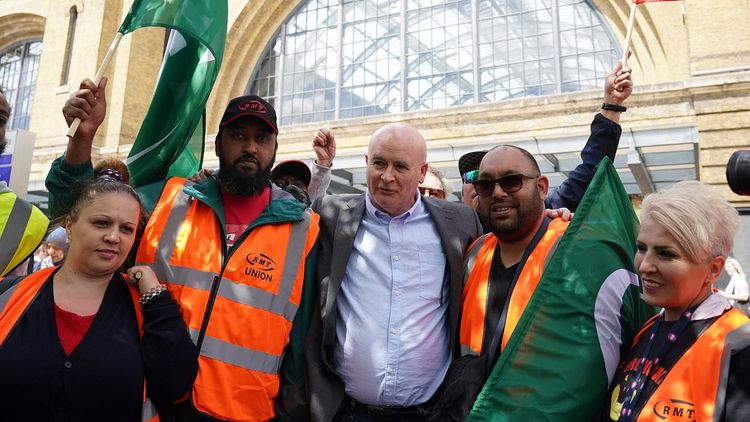Striking workers have now lost more in pay than they would have earned under a pay deal rejected by...

Train attendants have experienced an average financial loss of £3,608 since the commencement of strikes in June of last year.
, David Churchill, Primary Political Reporter For The Daily Mail
Last modified: 10:43 PM British Summer Time, August 31st, 2023.
Numerous rail workers who went on strike have experienced a greater loss in their earnings compared to what they would have incurred if their union leaders had agreed to the recent salary proposal.
According to statistics gathered by the Daily Mail, the train attendants will, on average, suffer a financial setback of £3,608 due to the upcoming strike tomorrow. This loss stems from the continuous series of protests that commenced last June.
The catering employees and ticket vendors at the station will lose a total of £2,992 in earnings.
On the other hand, if they had agreed to the Government's proposed salary increase of 9 percent, they would have received £3,448 and £3,065 respectively.
This implies that security personnel have experienced a decrease of approximately 10 per cent in their average total earnings of £37,540, whereas individuals working in catering and ticket sales have also faced a nearly 10 per cent reduction in their £31,150 salary.
Numerous rail workers on strike have experienced a greater loss in income compared to what they would have incurred if their union leaders had agreed to the current salary proposition. Shown in the image: Mick Lynch, the leader of RMT, alongside a protesting worker at a demonstration held outside London's King's Cross Station in the previous year.
Tomorrow, the RMT union will witness approximately 20,000 employees, including guards, catering staff, and ticket sellers, participate in their 25th strike since the previous summer. The image showcases a sign at Waterloo station, notifying the public of the imminent walkout on September 1st.
The information will cause Mick Lynch, the leader of the RMT union, to feel increased pressure to reach an agreement due to a potential uprising from members who are facing financial difficulties. Last week, Mr. Lynch communicated with rail executives presenting a potential solution to the ongoing conflict, hinting that the union's determination might be waning. However, industry leaders have rejected the suggested plan.
Tomorrow, approximately 20,000 individuals employed as guards, catering staff, and ticket sellers, who are members of the RMT, will engage in their 25th strike since last summer. This action will effectively suspend various sections of the railway system in England. However, in certain regions, up to 80 percent of trains might still be operational, while the overall percentage across the network is anticipated to be around 50 percent.
In the meantime, train operators who belong to the Aslef union are engaging in a strike today, resulting in the closure of most of the railway network.
Aslef has also collaborated with the RMT to cause maximum distress. Aslef members will decline to perform any extra work tomorrow. Member of the House of Commons transport committee, Tory MP Paul Howell, expressed his thoughts on the financial numbers: ‘This demonstrates the significant amount of earnings that the members are forfeiting.
"It is completely fitting that they are granted a chance to express their opinion on the proposed salary increase, as it is not the trade union leaders who will suffer financially. Their primary responsibility should lie in protecting the interests of their members, instead of attempting to weaken the Government's position."
According to information gathered by the Daily Mail, the data reveals that train guards are set to lose an average of £3,608 due to yet another strike occurring tomorrow. Additionally, on-board catering staff and station ticket sellers will suffer a financial loss of £2,992. In contrast, had they accepted the Government's proposed 9% pay increase, they would have received £3,448 and £3,065 respectively. The provided image depicts striking individuals in Reading, Berkshire during the previous month.
According to a high-ranking railway official, it raises the question of whether the RMT leaders truly desire to bring these strikes to an end. The RMT union has presented a proposal offering a pay raise of 13% to the most poorly paid employees, along with a commitment that no one will be forcefully laid off until the conclusion of the following year. Surprisingly, not a single member has expressed their opinion on this proposal through voting. This raises concerns about what the RMT leaders might be apprehensive about when it comes to their own union members.
The RMT has been given the opportunity to receive a 9 percent increase in pay over a span of two years, but they have declined to let their members vote on it. This decision comes as a surprise considering that in March, a similar offer of a 9 percent raise was widely accepted by Network Rail workers. A representative from the RMT stated that their members have already made sacrifices in order to reach a fair agreement regarding their pay, jobs, and work conditions.
In the past year and a half, they have conducted three separate voting sessions, and each time the majority voted in strong support of going on strike. During the most recent vote, the outcome was 9 to 1 in favor of strike action. Surprisingly, it is the Government that is firmly declining to authorize the railway companies to present an improved proposal that we can present to our members for a referendum.
Leaders in the hospitality sector argue that when coupled with the RMT strike that occurred the previous Saturday, the strikes happening this week will cause an additional £160 million in losses. On a larger scale, there are estimates suggesting that the total losses brought about by rail strikes since last summer amount to over £5 billion for the entire economy.









































